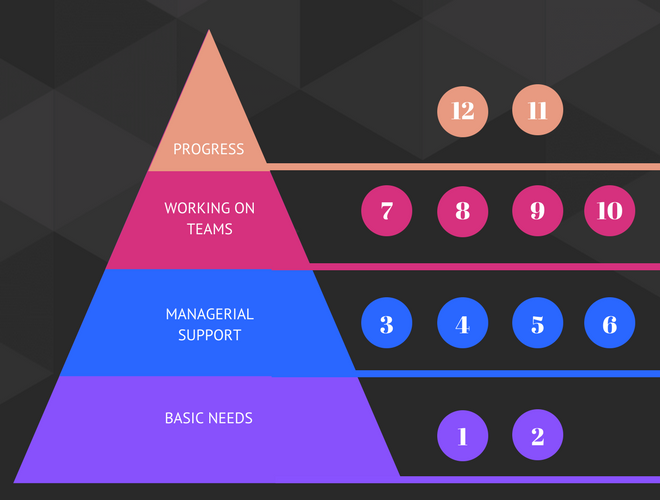When it comes to talking about employee engagement, we always end up going back to the latest Gallup poll that shows us the sad reality: In France, only 9% of salaried workers are actively engaged, while 91% are either completely disengaged in their work (26%) or are simply disengaged (65%). Furthermore, even though employee engagement varies from one country to the next, globally, two out of three salaried workers are disengaged in their work. This is a problem felt across all types of companies.
What do we mean by engagement?
Engagement refers to the behavior of certain employees regarding their activity and desire to positively advance company goals. An actively engaged worker is one that arrives in the morning with a smile on their face, happy and motivated to start the day and do the job he is paid to do. The same employee will promote the company outwardly, and will help co-opt his friends or acquaintances that he thinks will work well in the company. He will throw himself into his projects to obtain his goals and regularly surpass them. He will be the one to contribute the most effective elements that can be used by others to meet new challenges in future.
Next, you have a colleague that isn’t at all engaged, that doesn’t like his company and for whom work is simply a necessary chore to help pay the bills at the end of the month. For him, his life outside the company comes above all else (this doesn’t mean that the engaged employee doesn’t have a personal life, far be it from that.) For the unengaged employee, the end of the day is something he longs for as soon as his day has begun. These are the kinds of employees that when asked how they feel, they reply, “Like it’s Monday.” One can count on them to take on any number of assigned tasks, but don’t expect any kind of initiative to give more than is asked of them.
Finally, there’s the kind of employee that is classed as “completely disengaged.” They drag their feet to work in the morning and have no interest in their work, and are interested in everything but the result produced by their activity. Worse yet, the disengaged employee brings down company morale. Their goal isn’t to leave the company but they don’t care about succeeding there either.In fact, they’re completely indifferent.

A Significant Impact on Company Results
Gallup reveals that there is a significant difference between companies with good employee engagement and those without. As such, companies in the first quartile of the study are 17% more productive than those in the last quartile. In addition, they’re up to 21% more profitable. Disengagement is a significant loss for companies and represents a real waste during a period in which growth in France is difficult.
Factors That Succeed in Increasing Engagement
In order to evaluate employee engagement, Gallup created a framework based on 12 criteria. Each one of the criteria corresponds to categories in Maslow’s hierarchy of needs pyramid model. One finds four segments used by Gallup from the base to its peak:
- Basic
- Managerial support
- Working on teams
- Progress
For employee engagement to be at its highest, their needs must be based on each of the four elements, with those at the base of the pyramid considered a primary element to succeed in reaching the peak. It isn’t worth it to work on the higher segments of the pyramid if the bases aren’t being met because any imbalance in these elements creates disengagement.
The 12 criteria identified by Gallup are :
![]() I know what is expected of me at work.
I know what is expected of me at work.
![]() I have the material and the means to do my work correctly.
I have the material and the means to do my work correctly.
![]() At work, I have the opportunity to do what I do best, everyday.
At work, I have the opportunity to do what I do best, everyday.
![]() In the last 7 days, I received acknowledgement or recognition for having done good work.
In the last 7 days, I received acknowledgement or recognition for having done good work.
![]() My supervisor, or a colleague worries about me as a person.
My supervisor, or a colleague worries about me as a person.
![]() There is someone at work that encourages my professional development.
There is someone at work that encourages my professional development.
![]() At work, my opinions seem to count.
At work, my opinions seem to count.
![]() The missions and objectives at my company make me feel like my job is important.
The missions and objectives at my company make me feel like my job is important.
![]() My colleagues are engaged in doing good good work.
My colleagues are engaged in doing good good work.
![]() I have a close friend at work.
I have a close friend at work.
![]() In the last six months, someone has spoken to me about my progress.
In the last six months, someone has spoken to me about my progress.
![]() In the last year, I have had plenty of opportunities to learn and grow.
In the last year, I have had plenty of opportunities to learn and grow.

The issue of employee engagement is important for companies and should be part of company strategy. It is a subject that human resources ought to manage in partnership with the company board. Furthermore, it’s one of the most important parts of well-being at work, which a number of start-ups have been able to exploit in order to create teams that go above and beyond to make the company move forward. Larger companies have had more trouble integrating the change in the work model.
What do you think? Share your experience with us!
 Sébastien Bourguignon
Sébastien Bourguignon
As manager at a consulting firm, Sébastien works in the banking and insurance sector. He is an expert in computer science, innovation and startups, with 15 years of experience in the digital, new tech and agility domains. He adds value by rapidly transforming companies and allowing them to increase their performance with new digital technology.

